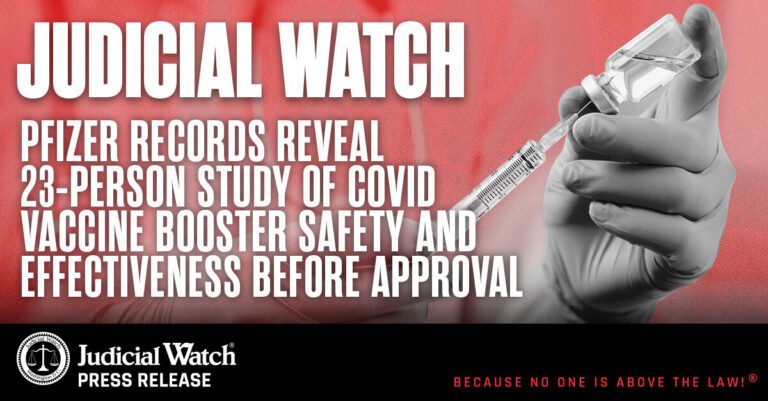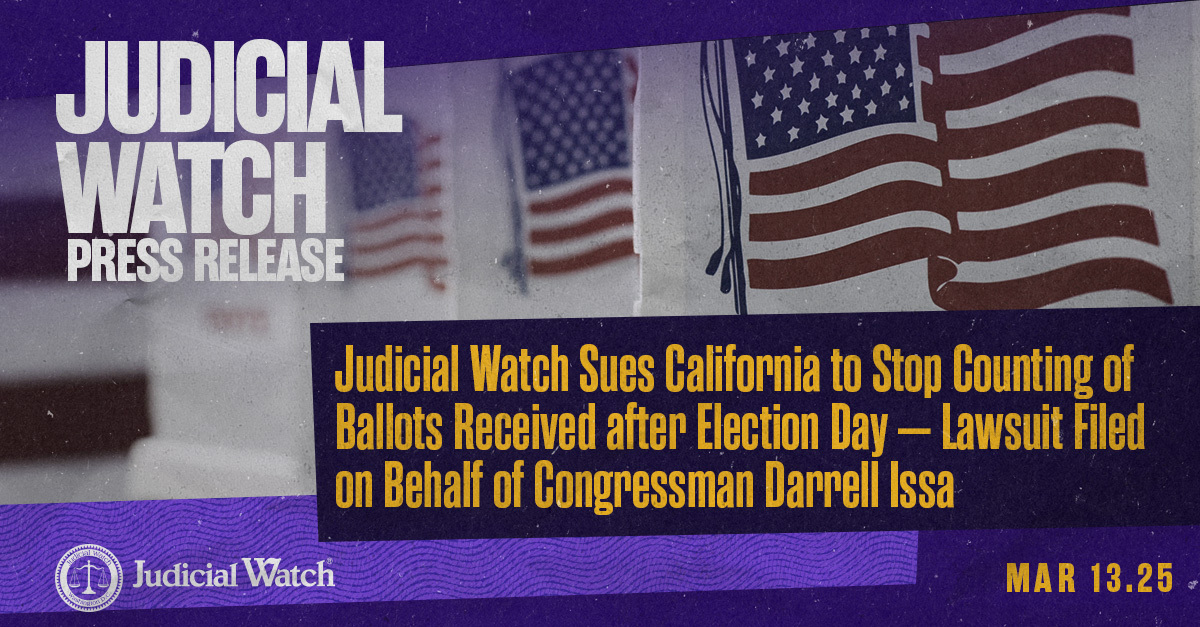
Judicial Watch: Pfizer Records Reveal 23-Person Study of Covid Vaccine Booster Safety and Effectiveness before Approval

(Washington, DC) – Judicial Watch released 58 pages of records from the U.S. Food and Drug Administration (FDA) showing that a Pfizer study surveyed 23 people in 2021 to gauge reactions to its Covid vaccine booster before asking the FDA to approve it. The FDA indicated that this production of records “represents our complete response to your request; no additional productions are anticipated.”
The records were obtained in response to a March 2022 lawsuit filed after the Department of Health and Human Services failed to respond to an August 2021 Freedom of Information Act (FOIA) request for records “submitted by Pfizer and BioNTech to the FDA, including BARDA, relating to ‘booster’ vaccinations for the SARS-CoV-2 virus” (Judicial Watch, Inc. v. U.S. Department of Health and Human Services (No. 1:22-cv-00730)).
Biomedical Advanced Research and Development Authority, BARDA, has been heavily involved with the development of the Covid-19 vaccine. According to its website:
The Biomedical Advanced Research and Development Authority (BARDA) provides an integrated, systematic approach to the development of the necessary vaccines, drugs, therapies, and diagnostic tools for public health medical emergencies such as chemical, biological, radiological, and nuclear (CBRN) accidents, incidents and attacks; pandemic influenza (PI), and emerging infectious diseases (EID).
BioNTech is a German pharmaceutical company that partnered with Pfizer in developing the original vaccine.
The records include a July study titled “Phase 1 Booster Safety and Immunogenicity Data up to 1 Month Post-Dose 3 of BNT162b2 30 µg [micrograms] in Study C4591001” provided “preliminary safety and immunogenicity data” for a group that had received two vaccine shots and, seven to nine months later, a third (booster) shot:
This submission includes preliminary findings from a subset of younger (18 to 55 years of age) and older (65 to 85 years of age) participants in the Phase 1 part of Study C4591001 who completed the initial two-dose series of BNT162b2 30 µg, given approximately 3 weeks apart, and then received a third dose (booster) of BNT162b2 30 µg approximately 7 to 9 months after the second dose. Data were collected through the cutoff date of 13 May 2021.
The participants were evaluated for symptoms up to one month after the booster shot. The booster’s immunogenicity, or how well a vaccine works over time, was evaluated seven days and one month after the booster:
SARS-CoV-2 50% neutralization titers were assessed in sera drawn before BNT162b2 Dose 1 (on Day 1); 7 days and 1 month after BNT162b2 Dose 2; before Dose 3; and 7 days and 1 month after Dose 3.
The participants included 11 people aged 18 to 55 and 12 people aged 65 to 85. Of the younger group, there were nine females and two males; eight of whom were white, one was black and two were Asian. Of the older group six were female, six were males, and all were white.
The study reports that a booster dose increases the breadth of neutralizing response against SARS-CoV-2 variants and that the data suggests that a third dose could prolong protection and further increase the breadth of protection:
[T]he durability of protection from vaccination and the required frequency of booster doses are unknown at this time. To date, results from the global Phase 1/2/3 study of BNT162b2 indicate robust protection lasting at least 6 months, despite modest waning of immunity over time. Booster doses have the potential to keep protection high if immunity continues to decline over time.
This Pfizer study was sent to Marion Gruber, PhD, director of the Office of Vaccines Research and Review.
An August 13, 2021, FDA-CBER (Center for Biologics Evaluation and Research) report is titled “Phase 1 Booster (Dose 3) Immunogenicity at 1 Month Post-Dose 3 in Study C4591001: SARS-CoV-2 Wild-Type and Delta Variant Neutralization Data.”
On August 24, 2021, the White House stated it was moving “aggressively” to roll out booster shots despite not yet receiving clearance from the FDA to give everyone third doses.
Shortly thereafter, it was reported that Gruber and her deputy, Phil Krause, were leaving the agency because they were frustrated with Centers for Disease Control (CDC) and Biden White House interference in vaccine decisions. Gruber and Krause were among a group of resigning doctors who agreed that “Available evidence doesn’t yet indicate a need for Covid-19 vaccine booster shots among the general population …”
On September 21, 2021, just over a month after Pfizer’s second submission, the FDA approved a single booster dose of the Pfizer-BioNTech vaccine for those over 65, for those 18 to 64 at a high risk of severe Covid-19, and for those whose frequent institutional or occupational exposure puts them at high risk of serious complications of Covid-19.
The FDA said it based its decision on the documents presented by Pfizer, as well as input from the CDC, the Israeli Ministry of Health and the University of Bristol in the UK.
Three weeks after approval, about 8.9 million boosters had been administered.
“With the planned push for new boosters by the Biden administration, the public would do well to examine these troubling documents about the shotgun approval of prior Covid boosters,” said Judicial Watch President Tom Fitton.
Through FOIA Judicial Watch has uncovered a substantial amount of information regarding Covid-19 issues:
- In July 2023, Judicial Watch sued DHS for records and communications between DHS component offices and the U.S. Biological Defense Program regarding a $2 million grant awarded by the DHS’s Ground Truth Network to EcoHealth Alliance, which is implicated in using tax dollars for “gain-of-function” coronavirus research at the Wuhan Institute for Virology and elsewhere in China.
- HHS records included the initial grant application and annual reports to the National Institutes of Health (NIH) from EcoHealth Alliance, describing the aim of its work with the Wuhan Institute of Virology in China to create mutant viruses “to better predict the capacity of our CoVs [coronaviruses] to infect people.”
- HHS records included emails of then-Director of the National Institutes of Health (NIH) Francis Collins showing a British physicians’ group recommended the use of Ivermectin to prevent and treat Covid-19.
- Heavily redacted HHS records showed that just two days prior to FDA approval of the Pfizer-BioNTech Covid-19 vaccine a discussion was held between U.S. and UK health regulators regarding the Covid shot and “anaphylaxis,” with the regulators emphasizing their “mutual confidentiality agreement.”
- HHS produced records regarding data Moderna submitted to the FDA on its mRNA Covid-19 vaccine, which indicated a “statistically significant” number of rats were born with skeletal deformations after their mothers were injected with the vaccine. The documents also revealed Moderna elected not to conduct a number of standard pharmacological studies on the laboratory test animals.
- In October 2020, Judicial Watch received FDA records that detailed pressure for Covid-19 vaccine booster approval and use.
- NIH records revealed an FBI “inquiry” into the NIH’s controversial bat coronavirus grant tied to the Wuhan Institute of Virology. The records also showed National Institute of Allergy and Infectious Diseases (NIAID) officials were concerned about “gain-of-function” research in China’s Wuhan Institute of Virology in 2016. The Fauci agency was also concerned about EcoHealth Alliance’s lack of compliance with reporting rules and use of gain-of-function research in the NIH-funded research involving bat coronaviruses in Wuhan, China.
- HHS records revealed that from 2014 to 2019, $826,277 was given to the Wuhan Institute of Virology for bat coronavirus research by the NIAID.
- NIAID records showed that it gave nine China-related grants to EcoHealth Alliance to research coronavirus emergence in bats and was the NIH’s top issuer of grants to the Wuhan lab itself. The records also included an email from the vice director of the Wuhan Lab asking an NIH official for help finding disinfectants for decontamination of airtight suits and indoor surfaces.
- HHS records included an “urgent for Dr. Fauci ” email chain, citing ties between the Wuhan lab and the taxpayer-funded EcoHealth Alliance. The government emails also reported that the foundation of U.S. billionaire Bill Gates worked closely with the Chinese government to pave the way for Chinese-produced medications to be sold outside China and help “raise China’s voice of governance by placing representatives from China on important international counsels as high level commitment from China.”
- HHS records included a grant application for research involving the coronavirus that appears to describe “gain-of-function” research involving RNA extractions from bats, experiments on viruses, attempts to develop a chimeric virus and efforts to genetically manipulate the full-length bat SARSr-CoV WIV1 strain molecular clone.
- HHS records showed the State Department and NIAID knew immediately in January 2020 that China was withholding Covid data, which was hindering risk assessment and response by public health officials.
- University of Texas Medical Branch (UTMB) records showed the former director of the Galveston National Laboratory at the University of Texas Medical Branch (UTMB), Dr. James W. Le Duc warned Chinese researchers at the Wuhan Institute of Virology of potential investigations into the Covid issue by Congress.
- HHS records regarding biodistribution studies and related data for the Covid-19 vaccines showed a key component of the vaccines developed by Pfizer/BioNTech, lipid nanoparticles (LNPs), were found outside the injection site, mainly the liver, adrenal glands, spleen and ovaries of test animals, eight to 48 hours after injection.
- Records from the Federal Select Agent Program (FSAP) revealed safety lapses and violations at U.S. biosafety laboratories that conduct research on dangerous agents and toxins.
- HHS records included emails between National Institutes of Health (NIH) then-Director Francis Collins and Anthony Fauci, the director of National Institute of Allergy and Infectious Diseases (NIAID), about hydroxychloroquine and Covid-19.
- HHS records showed that NIH officials tailored confidentiality forms to China’s terms and that the World Health Organization (WHO) conducted an unreleased, “strictly confidential” Covid-19 epidemiological analysis in January 2020.
- Fauci emails included his approval of a press release supportive of China’s response to the 2019 novel coronavirus.
###















